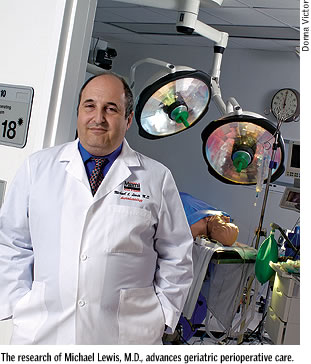|
Michael
Lewis, M.D., associate professor of clinical anesthesiology
and associate
program director in
the Department of Anesthesiology, Perioperative Medicine,
and Pain Management at the Miller School of Medicine,
notes geriatric patients have “different physiology,
they respond differently to stress, and there’s
no rhyme or reason to it.”
 The elderly (defined as those over
65 years old) are the fastest growing demographic
in the United
States and comprise 18 percent of the population
in Florida. As people age, they are more likely to
require surgery. They are also more likely to suffer
perioperative complications. The elderly (defined as those over
65 years old) are the fastest growing demographic
in the United
States and comprise 18 percent of the population
in Florida. As people age, they are more likely to
require surgery. They are also more likely to suffer
perioperative complications.
But current anesthesiology programs
emphasize pediatric and obstetric anesthesiology,
not geriatric anesthesia.
Living in South Florida, a haven for golden agers,
Lewis felt there was clearly a need to research and
create standards for geriatric perioperative care—and
he received a Fulbright scholarship to fulfill these
goals. The Fulbright Scholar Program sends 800 United
States faculty and professionals abroad each year
to lecture and conduct research in a wide variety
of academic and professional fields.
From February through August
last year, Lewis lived in Israel as a Fulbright
Scholar and studied how
to develop and implement an educational program designed
to enhance geriatric anesthesiology education. Lewis’s
partner in the project was Idit Matot, M.D., of the
Hadassah Hospital, Hebrew University, who also sponsored
his Fulbright application. Based on an established
course developed at the University of Miami, the
project aimed to export the content to Israel and
develop it into a Web-based educational program.
Lewis and Matot’s model, which includes an
asynchronous chat room with case studies and article
links, will soon be incorporated into the residency
program at Jackson Memorial Hospital. Lewis intends
for the collaboration to serve as a model for future
e-learning initiatives and to form the basis of a
new curriculum that addresses the anesthesia care
of the elderly.
Advancing geriatric perioperative care has long
been a priority for Lewis. A faculty member since
1996,
Lewis had been trying to pursue this research project
for some time but had trouble setting aside the
time for research in his busy day-to-day medical
practice.
His department chairman, David Lubarsky, M.D.,
M.B.A., helped him fulfill his dream.
“Academic research is a critical part of the
intellectual health of our department,” Lubarsky
says. “Academics
is for the inquiring mind, and that feature is the
one that makes working in an academic medical center,
in my opinion, so much more exciting than working
in a clinical private practice. By supporting experienced
academicians to go abroad and have an extended time
with academicians in different cultures, we expand
not only that scholar’s horizons but also our
own when new information and new techniques are brought
back into our home institution. As a Fulbright Scholar,
we are all impressed with the work that Dr. Lewis
did in Israel. He is an example of how much we all
benefit when we take the time and resources and invest
that in deserving UM faculty.” |